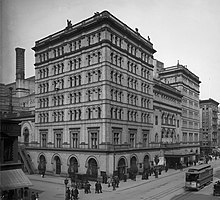Lothar Wallerstein
He emigrated to New York City in 1940 to evade the rise of Nazi influences in Austria, followed by the German annexation of that country, and the subsequent invasion of the Netherlands where he had sought refuge.
At the end of World War II, he returned to Europe, where he taught acting classes for singers, and founded an opera school in The Hague, Netherlands.
[2] Wallerstein was born on November 6, 1882, in Prague, Austria-Hungary, to Moritz and Bertha (née Reiniger) as one of six children in a Jewish family devoted to music.
He studied medicine, art and music at the universities of Prague and Munich and earned the Diplome de Virtuosite in piano from the Geneva Conservatory in Switzerland.
There he met Richard Strauss and played an off-stage piano in the third act of the world premiere of Der Rosenkavalier[2] at the Dresden Opera on January 26, 1911.
[6] From 1927 to 1930, Wallerstein taught opera classes at the Hoch Conversatory in Frankfurt, Germany—a school noted for such teachers as Clara Schumann and Engelbert Humperdinck.
[10] Wallerstein applied his interest in new acting and staging techniques in a collaboration with Krauss, who joined him in Vienna as conductor and brought new singers to the company.
Among Jewish artists exiled from the Festival were Bruno Walter, Max Reinhardt, Lotte Lehman, Herbert Graf, Hugo Burghauser, Elsa Kurzbauer and Wallerstein.
[15] At the State Opera in Vienna, where Wallerstein continued working during the winters, he evaded an arrest by the Gestapo and fled to Italy where he already had contracts with Teatro Reale in Rome and Maggio Musicale Fiorentino in Florence.
During Wallerstein’s years at the Met, he directed 28 operas primarily with the conductors, Erich Leinsdorf, George Szell and Thomas Beecham.
[18] While working at the Met, Wallerstein also accepted guest engagements with opera companies in Chicago,[19] Detroit,[20] Rio de Janeiro,[21] and Canada.
He also staged operatic scenes for the National Concert and Artists Association’s tour of the Metropolitan Opera Ensemble with Novotna, Glaz, Jobin and Singher.
Since the State Opera itself had been razed by Allied bombing, he directed performances at the Volksopera—the first postwar Tannhäuser followed by productions of Schwanda, Boris Godunov, Don Carlos, and Turandot.
[24] During the 1946 Summer Festival in Milan, he produced the staging for Lohengrin and Carmen in the giant Palazzo dello Sport built by Mussolini.


